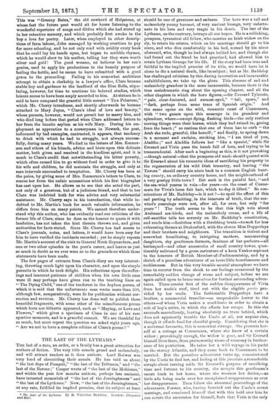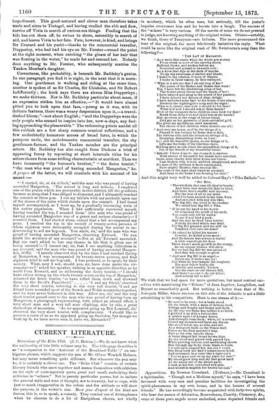THE LAST OF THE LYTHAM.*
THE last of a race, an order, or a family has a great attraction for authors of fiction. The very title sounds grand and melancholy, and will attract readers as it does authors. Lord Bulwer was very fond of chronicling their annals. He has told us about " the last days of Pompeii," "the last of the Tribunes," and "the last of the Barons ;" Cooper wrote of " the last of the Mohicans," and within the past few months authors, perhaps less eminent, have invented memorials of " the last of the Jerninghames" and "the last of the Lythams." Now, " the last of the Jerninghames," at any rate, fulfilled its implied promise, that its subject at least • The Last of the Lytham& By B. Whieldon Baddeley. London: Chapman and Hall. should be one of greatness and sadness. The hero was a tall and melancholy young baronet, of very ancient lineage, very unfortu- nate in his love and very tragic in his death. The last of the Lythams, on the contrary, betrays all our hopes. He is a rollicking, pompous, tyrannical old fellow, who marries an Irish widow on the sly, to retain his estates, which on his marriage should go to his niece, and who dies comfortably in his bed, nursed by his niece aforesaid, who, though he had always bullied her, and though she had found out the fraud he had practised, had allowed him to retain Lytham Grange for his life. If the story had been true and faithful to the implied promise of its title, we would have let it alone to die a natural death, like its subject ; but as Mr. Baddeley has challenged criticism by this daring innovation and inexcusable unfaithfulness, we take up the glove. This absence of sad and melancholy grandeur is the more inexcusable, because there is the true melodramatic ring about the opening chapter, and all the other chapters in which the hero figures,—Sir Everard Tylecote, "pale, clear-featured, and earnest-eyed," " tall, spare," and " dark, perhaps from some trace of Spanish origin." And the scene opens on the wild, romantic coast of Connemara, with " two gazers upon this seascape in its grandeur and splendour, where—except flying, flashing birds—the only restless moving things were their horses, which they had reined in, gazing from the beach ;" so restless that one of them has to curb " the Arab she rode, graceful, like herself ; " and finally, to spring down in a moment and exclaim, stroking him, " I am tired of you, Aladdin ;" and Aladdin follows her " like a spaniel," while Sir Everard and Vivia pace the beach full of love, and trying to be transcendental. After such a beginning as this, is it not provoking —though natural—that the pompous old uncle should quarrel with Sir Everard about his romantic ideas of sacrificing his property to the regeneration of his wild Irish tenantry, and leaving " the Towers" should carry his niece back to a common English hunt- ing county, an ordinary country house, and the neighbourhood of a very gossipy little town ? But such is the painful fact, "and the sea-wind yearns in vain—for years—on the coast of Conne- mara for Vivia's loose fair hair, which to-day it lifted." So con- scientious of Mr. Baddeley—is it not ?—to spoil the effect of this sad parting by admitting, in the interests of truth, that the sea- wind's yearnings were not, after all, for ever, but only "for years " ! The truth seems to be that this high vein about Arabsand sea-birds, and the melancholy ocean, and a life of self-sacrifice tells too severely on Mr. Baddeley's constitution, and sends him—doubtless with a throbbing brain—to seek for less exhausting themes at Drakenford, with the eleven Miss Dupperleys and their brothers and neighbours. The transition is violent and somewhat humiliating, to intriguing mothers, manoeuvring daughters, shy gentlemen-farmers, denizens of bar-parlours—all burlesqued—and other accessories of small country towns, ques- tionably enlivened by a gross caricature of a keen Yankee aspirant to the honours of British Member-of-Parliamentship, and by a sketch of a penniless adventurer of an incredible heartlessness and recklessness. But in this very humble mental atmosphere we have time to recover from the shock to our feelings occasioned by the remarkably sudden change of scene and subject, before we are again called upon to brace ourselves for further astounding adven- tures. These consist first of the sudden disappearance of Vivia from her uncle's roof, tired out with the eligible partis pro- vided by her uncle. The fashionable Dupperleys have a brother, a commercial traveller—an unspeakable horror to the others—of whom Vivia makes a confidante in order to obtain a suit of boy's attire, in which she effects her escape. In this she succeeds marvellously, leaving absolutely no trace behind, which does not apparently trouble the Uncle at all, nor anyone else, though it affords food for cheerful gossip. Considering that she is a universal favourite, this is somewhat strange. She presents her- self at a cottage at Connemara, where she knew of a certain widow ; provokingly enough, the widow is gone, and Sir Everard himself lives there, from praiseworthy views of economy in further- ance of his patriotism. Ile takes her a wild voyage in his yacht on the stormy Atlantic, and they come back to Connemara to be married. But the penniless adventurer turns up, commissioned by the Uncle to find her, and feeling at this juncture a remarkable scruple about turning aside Sir Everard's purpose of sacrificing time and fortune to his country, she accepts this gentleman's escort back to her home, where she resumes her duties,—as little ado being made over her unexplained reappearance as over her disappearance. Then follow the abnormal proceedings of the adventurer, Forster, who, having ferreted out the Uncle's secret marriage, and convinced himself that with this hold over him he can secure the succession for himself, feels that Vivia is the only
impediment. This good-natured and clever man therefore takes uncle and niece to Tintagel, and having studied the ebb and flow, carries off Vivia in search of curious sea things. Finding that the tide has cut them off, he swims to shore, ostensibly in search of aid, and leaves Vivia to her fate. Fate, however, is kind, and brings Sir Everard and his yacht—thanks to the commercial traveller, Dapperley, who had had his eye on Mr. Forster—round the point at the right moment, when catching " the gleam of her hair that was floating in the water," he made for and rescued her. Nobody does anything to Mr. Forster, who subsequently marries the Yankee Member's daughter.
Correctness, like probability, is beneath Mr. Baddeley's genius. In one paragraph you find it is night, in the next that it is morn- ing. One gentleman is walking and riding at the same time, another is spoken of as Sir Charles, Sir Chisholm, and Sir Robert indifferently ; the book says there are eleven Miss Dupperleys ; we make thirteen. Nor is Mr. Baddeley particular about sense, if an expression strikes him as effective,—" It would have almost pitied you to look upon that face,—young as it was, with its delicate features, there was a weary desperation upon it,—a travel- dashed bloom;"--nor about English ; "and the Dupperleys were the only people who seemed to inspire into her, now-a-days, any feel- ing approaching the pleasurable." The redeeming points amidst all this rubbish are a few sharp common-senaical reflections, and a few undoubtedly humorous scenes of broad farce, in which the pompous uncle, the melodramatic commercial traveller, the shy gentleman-farmer, and the Yankee member are the principal actors. Mr. Baddeley has also caught from Dickens a trick of appearing funny by repeating at short intervals titles for his actors chosen from some trifling characteristic or accident. Thus we have incessantly "the baronet's brother," "the fierce tourist," "the man who was proud of having ascended Mangerton," &c. A propos of the latter, we will conclude with his account of his ascent :- "' started, sir, at six o'clock,' said the man who was proud of having ascended Mangerton. The ascent is long and tedious. I employed one of the ponies which are procurable in this district, till the gradients became so steep that I was obliged to dismount, and I ultimately reached the summit at three p.m. I cut my initials with my penknife upon one of the stones of the cairn which stands upon the summit. I had found myself accompanied, as I went up, by a gradually increasing train of the native population. When I had sufficiently recovered myself, having reached the top, I counted them' (the man who was proud of having ascended Mangerton was of a grave and serious character)—' I counted them. I had started alone, except that a lad accompanied my pony. I reached the top in the society of twenty-seven persons, of \whom eighteen were incessantly occupied during the ascent in en- 4eavouring to sell me bog-oak. You smile, sir,' said the man who was ppud of having ascended Mangerton, observing Everard. 'Do you ddabt the accuracy of my account? '—Not at all,' Everard answered. BILAt one can't afford to lose any chance in life that is given one of being amused.'—'I cannot say, sir, that I see anything ridiculous in my account,' said the man who was proud of having ascended Manger- ton, stiffly. I merely observed that by the time I had reached the top of Mangerton. I was accompanied by twenty-seven persons, and that eighteen tried to sell me bog-oak. I was pestered, so to speak, by their society. What, may I ask, should you, sir, have done under the cir-
cumstanoes ? ' asked the speaker, turning in as opposite direction as he could from Everard, and so addressing the fierce tourist.—' I should have either strung up the whole twenty-seven on the top of Mangerton; returned the fierce tourist, or have rolled them down and drowned them in the Devil's Punchbowl.' and my friend,' observed the very short tourist, referring to the very tall tourist, '1 and my friend have ascended most of the Scotch and Welsh mountains together, and wo were never bothered in this way. Allow me, sir,' and the very short tourist passed over to the man who was proud of having been up Mangerton, a photograph representing, with rather an absurd effect, a very short man and a very tall man climbing, side by side, a great shale-slope of mountain. 'As we appeared going up Ben Lomond, sir,' observed the very short tourist, with complacency. 'I should like to possess a carte of us as we appeared going up Snowdon, but though we went up it, we have never seen it, have we, Alexander?'"































 Previous page
Previous page